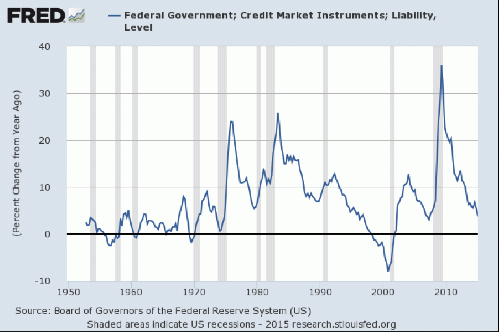(Originally published in the 9/18/15 Tennessee Cleveland Banner)
Rep. Vern Buchanan (R-FL16) wrote in a Fox News opinion column dated June 27, 2015 that America needs a balanced budget. Interestingly, just about that time, Greece was debating yet another round of austerity-driven cuts in an effort to placate the EU troika of lenders. Austerity measures have not only failed to bring about growth in Greece so far, but have actually been responsible for contracting the economy by more than a quarter since 2009. By any definition, this is worse than a Great Depression, and it shows no let up in sight.
The experience in America, which is more Monetarily Sovereign than the EU countries, though this is still a relative term, practiced stimulating the economy instead. The result is that we climbed out of the Great Recession and continue to grow our GDP and put people back to work, albeit slowly (Greece has over a 25% unemployment rate too).
And this is not the first
time. See the following
graph.

St. Louis Fed Chart of gov't liabilities during and bewtween recessions
(Image by St. Louis Federal Reserve) Details DMCA
Every recession going back to when record started being kept by the Fed in the 1950s shows that recessions are preceded by reductions in government spending and, more dramatically, are ended by increases in government liabilities (ie spending). This relationship has actually grown more forceful over time, with the largest spending-driven recovery during the 2008-2009 crisis. Interestingly, while we seem to be sputtering a bit lately, with just a .8% growth in GDP in 2014, government spending has dropped way down again. Perhaps we will unspend our way to a recession yet again?
Monetary Sovereignty
Representative Buchanan says that "so-called mandatory spending" will increase the debt and leave little room for things he seems to like better, like so-called national defense -- already the largest item in the discretionary budget and almost as large as the next 10 countries combined -- economic development, which he doesn't define, and peculiarly, veterans' services, which is a relatively small part of the budget and which Republicans like him have consistently fought against increasing.
But this article is not going to be about prioritizing some parts of the budget over others. Readers who are interested in that can try their hand at it by clicking on the link to the New York Times interactive quiz, highlighted in my 2011 Huffington Post article "Honey, I balanced the Federal Budget (And You Can Too)." It's not as hard as it seems to do so.
But is it necessary, or even desirable to do so?
(Note: You can view every article as one long page if you sign up as an Advocate Member, or higher).






